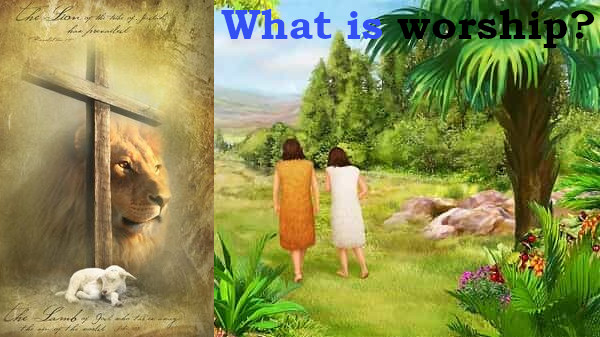PART A: Worshipping God
This article has three parts. Part A discusses what worship is before the fall of man and after the fall. Part B covers how we worship God today and the subject of worshipping in ‘spirit’ and in ‘truth’. In Part C, we have a teaching on David’s insight on worship.
Part A: What is worship
Definition of worship
Worship (verb) means action or efforts made to show our respect or love to God. We are worshipping God when we live our lives in accordance with His words, make prayers of thanksgiving, sing praises or just thinking of all His goodness to us.
When it is used as a noun, it means the act of worshipping God. In secular usage, the word worship can be used for anything a person adores, such as idolizing a film star. In this article, “worship” is confined to our respect for God.
Worship before the fall: perennial worship
Gen 2:15-17
v. 15: And the LORD God took the man, and put him into the Garden of Eden to dress it and to keep it.
v. 16: And the LORD God commanded the man, saying, Of every tree of the garden thou mayest freely eat:
v. 17: But of the tree of the knowledge of good and evil, thou shalt not eat of it: for in the day that thou eatest thereof thou shalt surely die.
The term before the fall refers to the period when Adam and Eve were without sin. They have not fallen to sin by eating the forbidden fruit as expressly prohibited by God. They obeyed God’s commands and lived their lives in fellowship with him. When they lived their lives in obedience to God’s commandments and avoided the only prohibition, (i.e., not to eat the forbidden fruit), they were engaged in perennial worship.
We can define perennial worship as living our daily lives with alacrity to God’s commands. During this sinless period, there is no special worship occasion as we know today. God visited them frequently (Gen 3:8). Unfortunately, when they sinned by disobeying the command not to eat the forbidden fruit, their daily worship was disrupted. They became afraid of God and hid themselves from Him (Gen 3:8-10).
Worship after the fall
1) The sacrifices
After man sinned, Adam knew shame and realized that he was naked. God killed an animal to make skin for Adam and Eve to cover their nakedness. Blood was inevitably shed in the process of killing the animal and it was clear that from that time onwards, to get access to God’s presence, blood must be shed to appease the sin that Adam committed.
Although it was not directly stated, Adam was instructed to sacrifice an animal whenever he wanted to get into God’s presence to worship Him. Adam’s descendants must have been reminded of this truth. We see Abel offering an animal sacrifice to God and was accepted. However, Cain offered a bloodless sacrifice and was rejected (Gen 4:1-6).
The Israelites has since been taught the importance of an animal sacrifice when they gathered to worship God. Later, Moses was given the law of sacrifices (Leviticus 23). The animal sacrifice to worship God is best exemplified in the Passover lamb. The Passover lamb was sacrificed so that the blood of the lamb can be applied on the doorpost of the Israelites’ houses. When the angel of death passed through the land of Egypt, houses that had blood on the doorposts were spared from punishment.
I. The institution of Special worship occasions
Lev 23:1-2
v. 1: And the LORD spake unto Moses, saying,
v. 2: Speak unto the children of Israel, and say unto them, concerning the feasts of the LORD, which ye shall proclaim to be holy convocations, even these are my feasts.
After the fall of man, God instituted special worship occasions which the Israelites have been observing till this day. The Sabbath is the most well-known occasion followed by the Passover. These special worship occasions are instituted by God to strengthen the Israelites’ faith in God and are all representatives of God’s salvation plan.
II. Perennial worship is not abolished
Most people consider worship happens on special occasions only. However, after the institution of these worship occasions, God has never abolished the practice of perennial worship of Him by His people. He delights in His people worship, not only on special occasions but when they live their lives in obedience and respect towards all His commandments.
A good example was in Joseph life. His rebuke to Potiphar’s wife when she enticed him to sin tells us clearly that he worshipped God perennially (Gen 39:9). Clearly, obedience and respects towards God’s instructions (all acts of worship) must be constantly observed and exercised.
Deuteronomy 6:5-7:
v.5: And thou shalt love the LORD thy God with all thine heart, and with all thy soul, and with all thy might.
v. 6: And these words, which I command thee this day, shall be in thine heart:
v. 7: And thou shalt teach them diligently unto thy children, and shalt talk of them when thou sittest in thine house, and when thou walkest by the way, and when thou liest down, and when thou risest up”.
With God’s blessings,
CL




Comments
Post a Comment